African enterprises to ramp up cloud investments in 2023
January 26, 2023

The majority of African enterprises are planning to increase investment in cloud services in 2023. This according to the Cloud in Africa 2023 research study from World Wide Worx.
The study showed that around 69% of those surveyed said they would increase spending in 2023, while 24.3% said they would keep spending the same and 6.7% were planning to decrease cloud spending.
The trend of investment in cloud continued from 2022, when 61% of enterprises increased their cloud spend, 36.2% kept investment level and 2.7% decreased spending.
"I think what you're seeing is that during the pandemic, the increased investment in the cloud was all about business continuity. But as a result of that investment, most companies saw massive benefits in business growth, innovation, and in particular, improved customer service. That has encouraged them to invest even further," explained World Wide Worx CEO Arthur Goldstuck who was presenting the research at a virtual event this week.
"When you are spending money on a particular strategy and that strategy is paying off at such a high level, you're going to spend more money on that kind of strategy, you're not going to pull back. So, I think what we're seeing is that success is feeding on itself," he added.
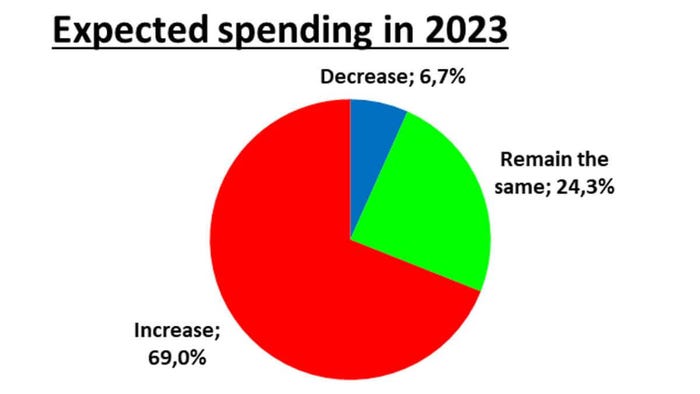
(Source: World Wide Worx)
On those deciding to invest less he said those were likely enterprises that had invested heavily when the pandemic hit, and were now pulling in the reins because they felt the demands for the company on cloud platforms had diminished.
The study was conducted with the support of Dell Technologies, VMware, Intel, F5 and Red Hat and surveyed small, medium and large enterprises across eight African countries, including the key markets of South Africa, Nigeria and Kenya.
Maturing market
"We've seen pervasive cloud adoption across Africa in the last few years, from 2015 to today. As we've conducted the research every two years, we've seen an intensification to the extent that it's almost unanimous in terms of cloud adoption. But what's not unanimous or pervasive is mature strategies in the use of cloud," Goldstuck said.
Two years ago 100% of companies said they were using the cloud, but in 2023 this dropped to 98.8% of companies.
"That 1.2% [not using the cloud] represents a small number of companies that would have stopped using the cloud, or found the cloud wasn't working for them, or once they came out of the pandemic, felt they could go back to being purely on-premise," he said.
Another interesting finding was how many African enterprises are using multiple cloud providers in comparison to global counterparts.
"In Africa, we find roughly 60% of enterprises are using only one cloud provider, which means that just under 40% are multi-cloud users. That is way behind the global average [of over 70% using multi-cloud], which tells us that we are still in an immature cloud adoption environment, it's still evolving," Goldstuck explained.
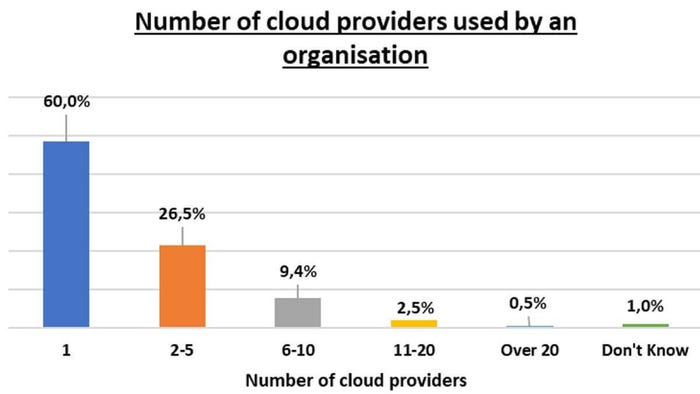
(Source: World Wide Worx)
"It seems cloud for specific applications – for backup and for other reasons – is the emphasis of most organizations," he added. "Once they start going for more complex strategic implementation of the cloud, as opposed to simple digital transformation, then they'll start adopting multi-cloud strategies. But so far, just under 40% have done so."
This speaks to another key survey question of what kind of cloud applications (not mobile apps) are currently being used in the cloud by enterprises. Goldstuck said the results give a "very good indication of why we're not yet in a multi-cloud environment".
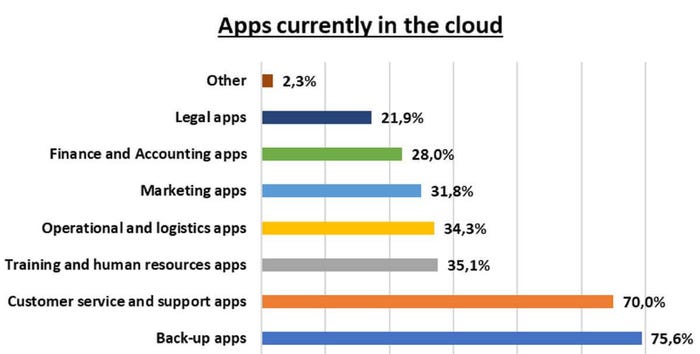
(Source: World Wide Worx)
The research showed that over 75% of organizations are using the cloud purely for back-up.
"That's the classic purpose of the cloud going back to its beginnings, and certainly the beginnings of its uptake across the African continent. Where globally that's the proportion of companies that have a multi-cloud strategy, across Africa it's the proportion that are still using the cloud for storage."
Close behind at 70% is cloud for customer service and support applications.
"It shows how important the cloud is in serving the customer, far more than serving internal requirements of the business, such as training and human resources (35.1%), operational and logistics (34.3%) or marketing applications (31.8%) which are all internally focused. The external environment is a critical area of cloud impact," Goldstuck said.
"What we're seeing globally is along with multi-cloud strategy is also a strategy of combining multi-cloud with on-premise, both for purposes of efficiency, and for security ... By 2026, we can expect that the cloud landscape across major African markets will look very similar to the global landscape," he added.
Difficulties diminished
What researchers found fascinating was that when companies were asked what difficulties they had in cloud adoption, almost three-quarters (72.5%) said they didn't have difficulties in cloud adoption at all.
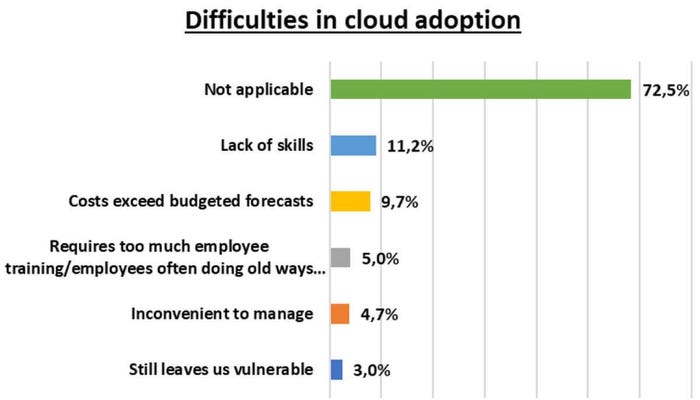
(Source: World Wide Worx)
If you look at the 28% of companies that did have difficulties, a lack of skills is the single biggest challenge for one-third of those companies.
"That speaks to the fact that while we are seeing this global lay-off in the tech world, at the same time there is a shortage of very specific skills. That will probably result in a high level of reskilling taking place. But across the African continent, we are not seeing that great lay-off, because of the fact that there is still a skills shortage across various areas of IT and particularly cybersecurity and cloud computing," Goldstuck said.
The second highest regarded challenge was costs exceeding budgeted forecasts, which was a problem for almost a third of respondents that cited difficulties.
"This means that companies are not anticipating effectively or accurately what their costs are going to be in areas like cloud and cybersecurity. That doesn't just speak to poor planning, which can be a factor, it really speaks to unexpected demands on the IT department. You can almost adopt the principle that you can never have too much budget to prepare for the unexpected in IT and in particular in cloud and cybersecurity," said Goldstuck.
Security surety
Another surprising finding was how the view on security has changed for enterprises when operating in the cloud. When asked about key security concerns, almost 74% of respondents said they had no security concerns in their cloud work, while 26% of respondents had some cloud security concerns.
"It might seem counterintuitive as we are used to the idea that the cloud scares companies. But what companies have in fact found is that, due to the extent of protection available, and cybersecurity services available in the cloud, they are actually safer in the cloud, than in their own network," Goldstuck said.
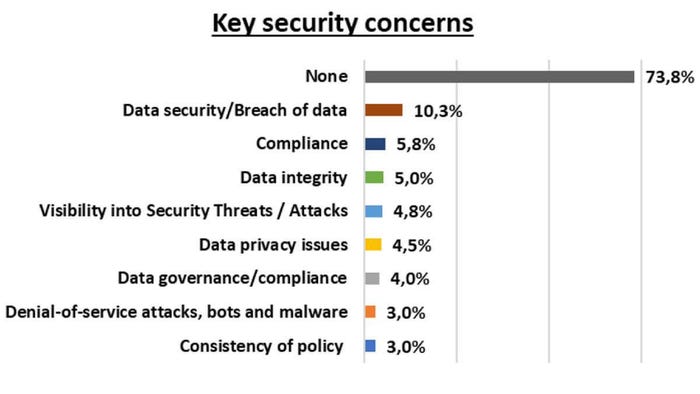
(Source: World Wide Worx)
"One in ten companies still are concerned about the potential of a data breach, or a data security lapse, and we do see that happening in the cloud. We don't yet have bulletproof cloud computing, but it almost feels like it is on its way," he said. "The occasional cloud breach or cloud lapse makes big news, precisely because it happens so rarely."
About one in 20 companies are also concerned about areas like compliance, data integrity, visibility into security threats and data privacy issues.
"The cloud providers and third-party product providers have pretty much addressed that [security] issue to the extent that customers are confident that they are protected," he added.
Want to know more about cloud computing in Africa? Check out our dedicated Cloud content channel here on Connecting Africa.
Goldstuck found that when it comes to the ways companies protect themselves from security breaches in the cloud, 58.6% are using native tools from public cloud providers, and a further 31.9% are using third-party security products from the public cloud marketplace. Only 16.2% are using third-party software-as-a-service (SaaS) security platforms.
When commenting on the major benefits provided by the cloud, over half of respondents said improved security was top, while almost 44% cited improved customer service as a key benefit and 41% said business efficiency.
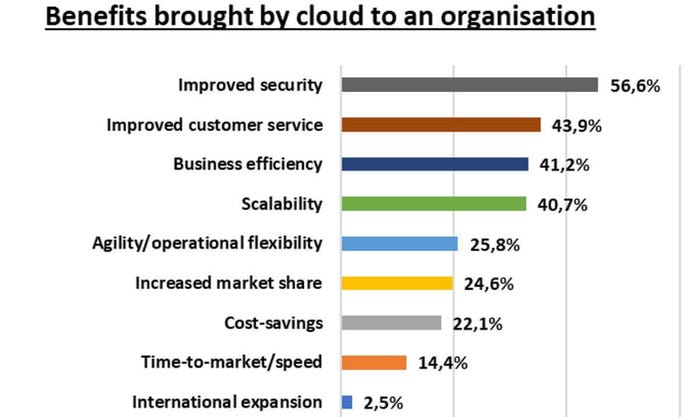
(Source: World Wide Worx)
Related posts:
*Top image source: Image by rawpixel.com on Freepik.
*All graphs courtesy of a presentation by World Wide Worx CEO Arthur Goldstuck on the results of the Cloud in Africa 2023 research study.
— Paula Gilbert, Editor, Connecting Africa
.jpg?width=700&auto=webp&quality=80&disable=upscale)

_Solly_Malatsi.jpg?width=700&auto=webp&quality=80&disable=upscale)
_(1).jpg?width=700&auto=webp&quality=80&disable=upscale)


_(1).jpg?width=800&auto=webp&quality=80&disable=upscale)